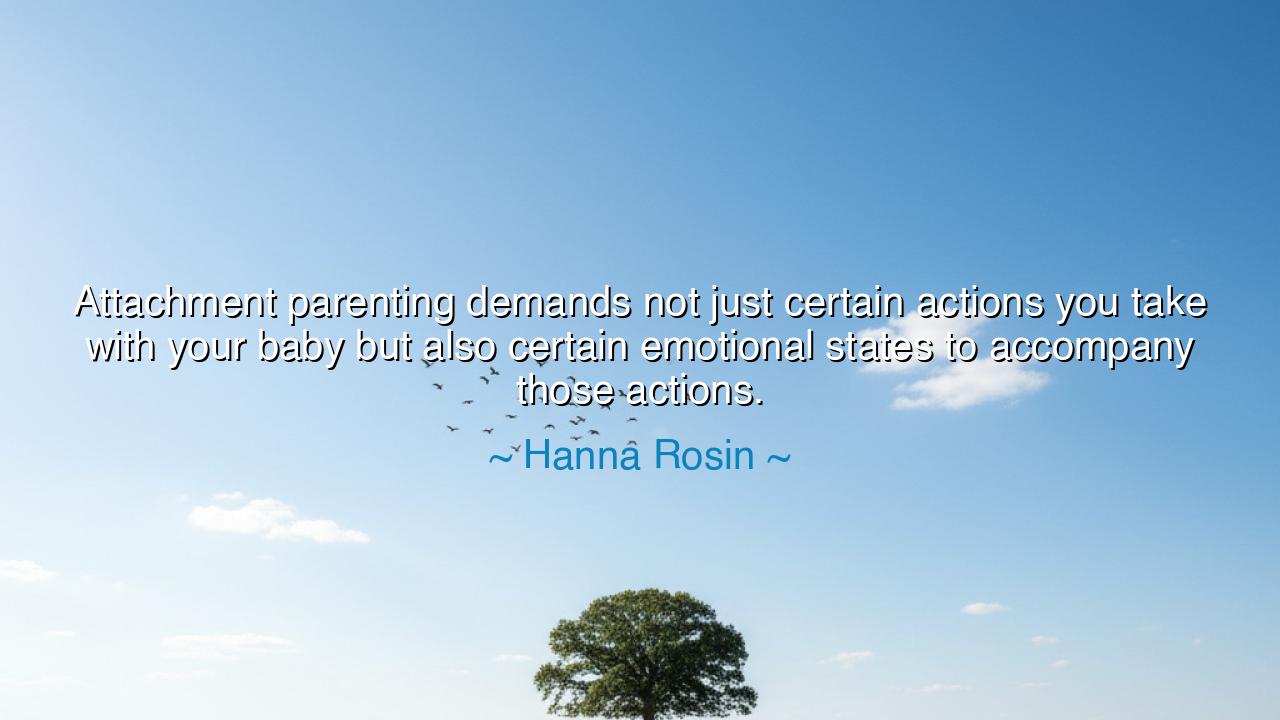
Attachment parenting demands not just certain actions you take
Attachment parenting demands not just certain actions you take with your baby but also certain emotional states to accompany those actions.






Hear the words of Hanna Rosin, sharp and discerning: “Attachment parenting demands not just certain actions you take with your baby but also certain emotional states to accompany those actions.” In this truth she reveals the essence of attachment parenting—that it is not merely a checklist of duties, nor a set of mechanical tasks performed by weary hands. It is a way of being, a union of body and soul, where the outer act must be infused with inner tenderness. For what use is holding a child close, if the heart is far away? What benefit is there in feeding, if the parent’s spirit is cold or resentful? Parenting, Rosin reminds us, demands not only deeds, but the right spirit within those deeds.
From the beginning of time, mothers and fathers have known that infants are not only fed by milk but by emotion. A baby senses the presence of love in the tone of a voice, the warmth of a touch, the calm or storm in the parent’s heart. The ancients may not have named it “attachment parenting,” but they understood its essence. Among the Hebrews it was written that a mother may forget her child, but true love never ceases. Among the Greeks, philosophers like Aristotle spoke of nurturing as the foundation of virtue. What Rosin names is as old as humanity itself: that care is more than action—it is presence, spirit, and intention.
History gives us a tale of Empress Maria Theresa of Austria, who bore sixteen children. She was not merely queen, but mother, deeply engaged in their upbringing. Even while governing vast lands, she insisted on personal involvement with her children—teaching them, writing to them, and showing them affection. Her rule was not simply one of power but of emotional connection, which bound her children’s loyalty even in turbulent times. She embodied what Rosin describes: parenting that joins action with a state of heart, discipline with warmth, and care with devotion.
Rosin’s warning, however, is that attachment parenting can demand too much, not only of the body but of the spirit. For it is one thing to carry a child, to nurse them, to sleep beside them—it is another to maintain constant serenity, constant patience, constant softness. The demand is not only physical but emotional, and therein lies the difficulty. Parents may be tempted to see themselves as failing if their hearts feel weary, if their spirits grow impatient. But Rosin’s insight reveals that this style of parenting is as much about expectation as about practice. It calls parents to a near-impossible standard—not only to act, but to feel perfectly in tune with the child at all times.
Yet even in this difficulty, wisdom may be found. For while no parent can be perfect, the aspiration itself has power. To remember that one’s emotional state matters is to be reminded of the sacred bond between parent and child. It urges the parent not to go through motions, but to enter fully into the relationship, to strive for presence even when tired, to offer not only touch but warmth, not only food but love. It teaches that the soul of parenting is not in perfection, but in awareness—that how you feel, how you carry yourself, is as much nourishment to the child as what you do.
The lesson, then, is clear: parent with presence. Let your actions be guided not by duty alone, but by love that flows from within. Do not despise your weariness, but acknowledge it, and return again to tenderness. When you hold your child, let your heart soften; when you feed them, let your spirit bless them; when you comfort them, let your presence be whole. For children do not remember every single act, but they remember the atmosphere of love in which they were raised.
Therefore, let all who hear these words take action: guard your emotional state as carefully as your actions. Seek balance, rest, and renewal, for a weary soul cannot give what it does not have. Surround yourself with support, ask for help when needed, and know that love flows best from a heart that is also cared for. By doing so, your parenting will not only meet the needs of the body, but will enrich the soul of your child, laying foundations that endure through a lifetime.
Thus Hanna Rosin’s words, though modern in form, echo the eternal wisdom of the ancients: true parenting is not in action alone, but in the spirit that accompanies it. And when action and heart are joined, when duty and love move as one, the child grows not only strong in body, but secure, resilient, and deeply cherished.






AAdministratorAdministrator
Welcome, honored guests. Please leave a comment, we will respond soon